Introduction: In this article, Duncan Kuehn describes the puzzling circumstances surrounding the death of writer Edgar Allan Poe, a real-life story as mysterious and macabre as any tale or poem he ever wrote. Duncan is a professional genealogist with over eight years of client experience. She has worked on several well-known projects, such as “Who Do You Think You Are?” and researching President Barack Obama’s ancestry.
Edgar Allan Poe’s cause of death is still unclear to this day. He died 7 October 1849 after a mysterious medical condition that lasted several days prior to his demise. Nearly two hundred years later most people have heard of Edgar Allan Poe, and many have experienced the thrill of reading one of his stories of mystery and the macabre. He was the inventor of the detective story, whom even Sherlock Holmes’s author honored. Poe’s literary style was not moralistic or allegorical. He told a story simply for the thrill of the story.
But the story of his final days is also a thriller full of mystery and confusion. Let’s examine some of the documentation and discussion of the mystique around his Edgar Allan Poe’s death.
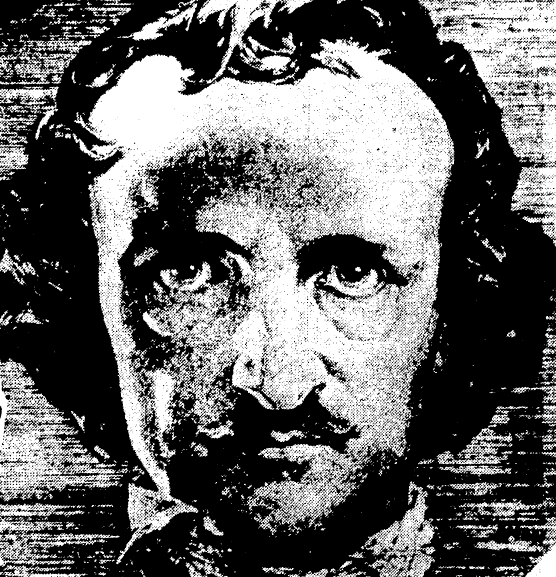
How Did Edgar Allan Poe Die?
There are multiple accounts of Poe’s last days. Although he had been feeling unwell for some time, he was rekindling a romance with his childhood sweetheart—and things seemed to be going well in his life. However, on 3 October 1849—Election Day—he was found in a Baltimore street gutter in a disheveled and incoherent state. He was in clothes that did not belong to him and was unable to account for his current state. The friend that found him took him to the hospital where, after several days of illness and incoherency, he died on the 7th of October. He was 40 years old.
Many believed that he was drunk, but there is some dispute on whether or not he smelled of alcohol. Other theories, historical and modern, include: “delirium tremens, heart disease, epilepsy, syphilis, meningeal inflammation, cholera, and rabies.”* Poe was also an acidic literary critic and it has been suggested that something malicious could have happened to him as a result.
There was one person, Dr. John Joseph Moran, who remained with him during the extent of his brief hospital stay. However, this man’s story changed over time—a story he gave in exchange for money—and his statement of Edgar Allan Poe’s last words (“Lord, help my poor soul”), didn’t seem plausible to his friends and were unlikely in his medical condition. These things lead one to question the reliability of this source.
Missing Records
Tragically, all documentation during Poe’s last days, including hospital records and even his death certificate, are missing. What is still existent are newspaper articles, both contemporary and reflective. In the following article, written 100 years after his death, the reporter tried to trace the last days of Poe. He also tried to incorporate nearly every theory of his death into one.
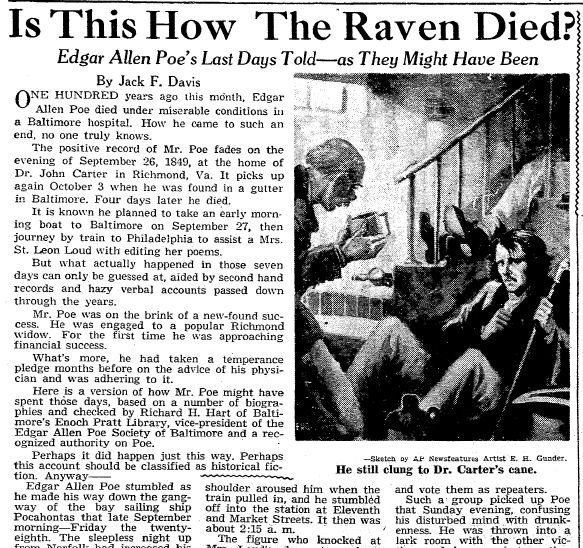
Unfortunately, the statements given are not cited or even attributed, making it impossible to evaluate their accuracy. Without more information it is hard to tell what is first-hand (primary) information and what is second-hand information—or even intentional mythology. But it makes for interesting reading.
Rufus Griswold
Poe appears to have been a polarizing character. He had staunch friends and bitter enemies. Many of these people were prolific writers and had great influence. Some of these enemies, especially Rufus Griswold, took advantage of the inexplicable circumstances surrounding Poe’s death to assassinate his character. Griswold was a contemporary writer with whom Poe had repeated interaction, including possibly a love rivalry. Poe had been critical of Griswold’s work, and “Griswold succeeded Poe as editor of Graham’s Magazine at a higher salary than Poe’s.”**
Griswold seems to have undertaken a calculated attack against Poe after his death. His disparaging obituary written under the pseudonym “Ludwig” went viral and left a lasting scar on Poe’s public image (see article below). Many people, even today, have been hoodwinked by Griswold’s depiction of Poe as a wild, depraved drunk who happened to write chilling horror stories. Some feel that this scandalous image helps to make his writings even more thrilling.
Griswold cruelly began Edgar Allan Poe’s obituary:
Edgar Allan Poe is dead…This announcement will startle many, but few will be grieved by it. He had readers…but he had few or no friends.
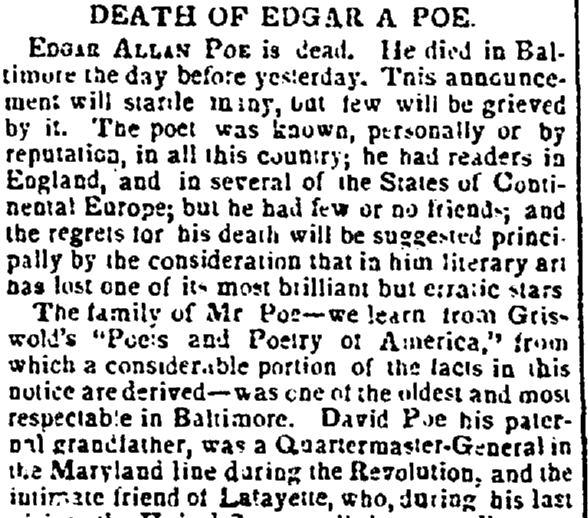
Farewells from Friends & Fans
Not everyone was of the same mind as Griswold. A more complimentary article announcing his death opined:
Mr Poe was equally remarkable for his genius and his acquirements…He had acquired accomplishments rarely attained by men far more advanced in years.
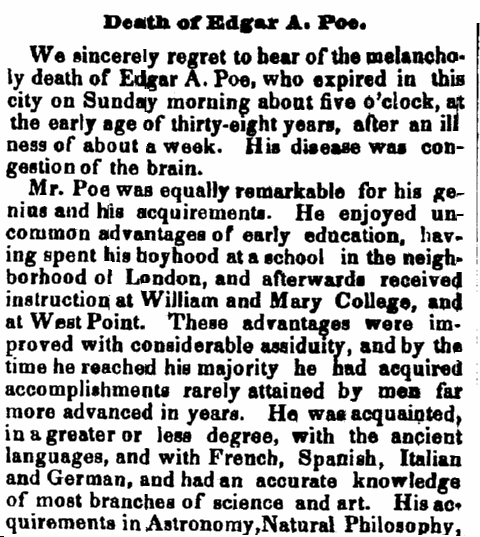
Another writer naively stated:
His literary abilities were unquestionable; and had they been properly chastened and exerted under the guidance of a clear heart and head, he might have left a name among the first upon the list of those who have enriched American literature with productions of lasting interest and value.
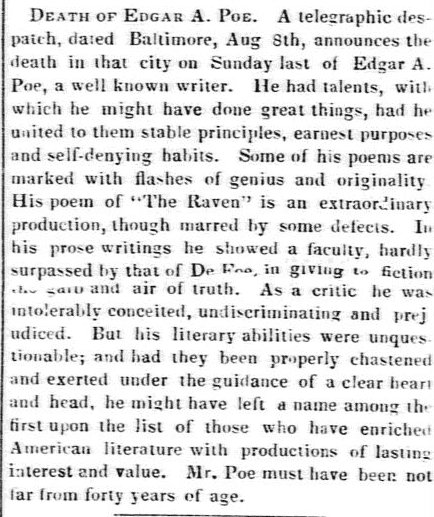
While it was generally assumed that Poe had drunk himself to death, his friend actively defended his sobriety. He had struggled with excessive drinking in the past, but had been under control for some time and had even signed a sobriety pledge shortly prior to his death. While it is possible he fell off the wagon, there are witnesses who say his breath and person did not smell of alcohol.
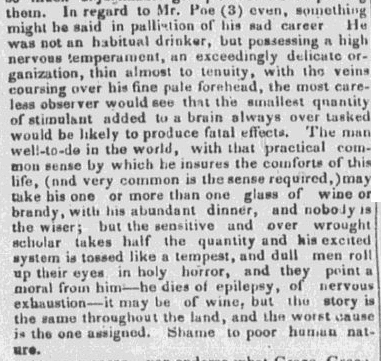
Who Was the Real Edgar?
So who was Edgar Allan Poe really? Was he a depraved drunk? Was he a troubled man? From my readings, Poe emerges as a sympathetic character with literary genius and a challenging life surrounded by the untimely deaths of many of those closest to him, including his father, mother, wife, and close friends. He dealt with these challenges and with the artist’s stereotypical mood-swings using escapism: gambling, drinking, and running away when he perceived it necessary. He had strong opinions about his trade and was fearless in their expression. He needed to be loved. His writing remains influential and he was one of the first authors to attempt supporting himself on his pen alone. It is highly unfortunate that more original documentation about his life does not survive to give us a clearer picture of him.
Perhaps a fitting tribute would be to read one of his stories this Halloween, or perhaps print and frame a copy of one of his famous poems from a newspaper article? Make sure you peruse through the Baltimore Gazette and Daily Advertiser which published some of Poe’s earliest poetry.
Here’s an example, this one from a Vermont newspaper.
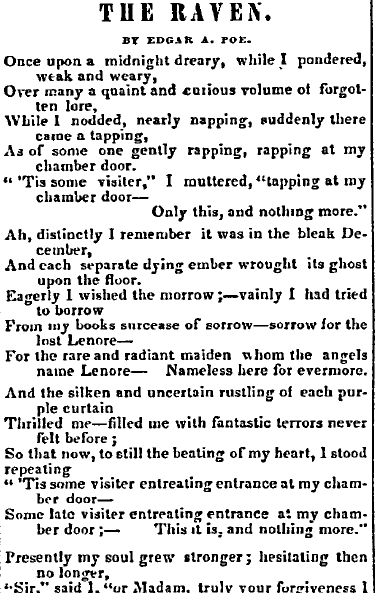
Genealogy Challenge:
Investigate the newspaper archives and sleuth for more clues surrounding Edgar Poe’s mysterious death. Please share you finds with us in the comments.
Explore over 330 years of newspapers and historical records in GenealogyBank. Discover your family story! Start a 7-Day Free Trial
————-
* Unless otherwise attributed, all information comes from old newspapers and Wikipedia’s article, “Edgar Allan Poe”: http://en.wikipedia.org/wiki/Edgar_Allan_Poe, accessed October 2014.
** Wikipedia’s article, “Rufus Wilmot Griswold”: http://en.wikipedia.org/wiki/Rufus_Wilmot_Griswold, accessed October 2014.
Related Articles & Resources:

Thanks for an interesting and intriguing article, Duncan!
Thanks Daniel! Poe is a fascinating character.
I think he died of drugs/hallucinations. I say that because in the article it said that he smelled of alcohol and that his clothes didn’t fit him. So to me, I feel like that he was drugged and that his death was real.
Could well be, Kaila. His death will probably forever remain a mystery. Thanks for writing us!